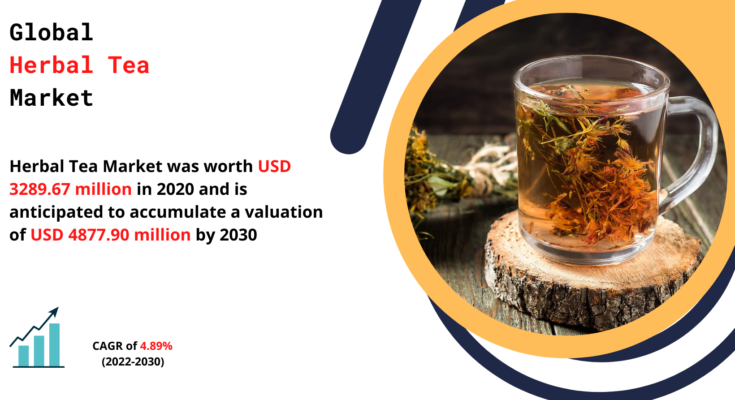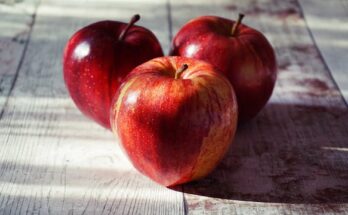Herbal Tea Market : Introduction
Herbal tea is an infusion of multiple leaves, fruits, flowers, roots associated to roughly any edible, non-tea plant. It is traditionally referred to as tisanes in Europe and few other areas of the world.
Since, it is not derived from the Camellia sinensis plant (i.e. the plant used to produce black, green and oolong tea), herbal tea is not essentially a true tea.
It is evolving as a new trend with the rise in health consciousness among people.
The hike in popularity of herbal tea over the past several decades is due to not only their vibrant flavour, but also its mental and physical health benefits.
In ancient days, herbal blends were used for their competence to invoke spiritual awareness and enable consumers to reap its physical benefits.
However, eventually consumers started drinking herbal tea merely for its wonderful taste and aroma.
Global Herbal Tea Market: Overview
The global herbal tea market was worth USD 3289.67 Million in 2021 and is anticipated to accumulate a valuation of USD 4877.90 Million by 2030, registering a CAGR of 4.89%.
Depending upon the type of herbal tea, consumers can extract numerous benefits such as, aiding digestion, overcoming sluggishness, soothing joint pain, or sleeping better.
Herbal tea if simply considered as a natural alternative to prescription medicines, could be a crucial factor in growing its consumption contemporarily.
Since many people face lack of sleep due to several reasons, herbal tea can be used to overcome this issue, hence driving the market growth.
Increase in population alongside rise in disposable income are some driving factors determining the growth of the herbal tea market in the forthcoming years.
There has been a rise in the health consciousness of the masses due to various factors. A steep rise in the prevalence of chronic ailments and growing prevalence of stress-induced disorders has shifted the inclination of individuals towards the consumption of healthy beverage products. This in turn has escalated the demand for herbal tea worldwide.Growing per capita income level of individuals is expected to drive industry growth
With widespread economic developments, there has been a massive increase in the disposable income level of individuals across major regions. Herbal tea falls in the category of luxury functional beverage and hence, is costly in nature. Therefore, individuals with a high purchasing power can afford the product more easily, which in turn is stimulating the overall industry outlook.
Competitive Landscape:
- Tielka
- Mountain Rose Herbs
- Tega Organic Teas
- Terra teas
- Arbor teas
- Tetley
- Indigo herbs
- The Indian Chai
- Twinings
- Organic India
Segmental Analysis of Global Herbal Tea Market:
Based on Raw Material
- Yellow Tea
- Black Tea
- Green tea
Green Herbal Tea provides a wider spectrum of varieties and new product developments in relation to black Herbal Tea.
Based on Flavour Type
- Fruits
- Chamomile
- Peppermint
- Lemongrass
- Ginger
- Hibiscus
Based on Packaging
- Loose Tea
- Tea bags
- Plastics Containers
- Aluminium Tins
- Paper Pouches
Based on Distribution Channel
- Online Retail
- Supermarkets or Hypermarkets
- Convenience Stores
- Speciality Stores
- Others
Based on Region
NORTH AMERICA (Canada, US), EUROPE (Spain, UK, Germany, Italy, France), ASIA-PACIFIC (India, China, Thailand, Japan, South Korea), LATIN AMERICA (Colombia, Brazil, Mexico, Argentina), MIDDLE EAST & AFRICA (UAE, Saudi Arabia, South Africa)
Eastern Europe, and North America are in increasing demand for Herbal Tea, which is the potential market and established markets for Herbal Tea because of its anti-aging properties. New Herbal Tea brands are appearing weekly due to the increasing demands for processed foods and ready-to-drink beverages on a large scale.
Major Developments:
Twining Crosfield and Company Ltd. launched Berry Fusion, Lemon Delight, and Buttermint herbal tea in November 2017.
Major questions answered in the report:
- What are the major challenges, growth factors in this market?
- Which top companies are contributing in this market?
- Which regional segments accounts for the largest share of this market?
Key Takeaways from the report:
- Deep-insights in regional analysis.
- Growth factors, trends, challenges.
- The global herbal tea market was worth USD 3289.67 million in 2020 and is anticipated to accumulate a valuation of USD 4877.90 million by 2030, registering a CAGR of 4.89%.
About We Market Research
We Market Research is an established market analytics and research firm with a domain experience sprawling across different industries. We have been working on multi-county market studies right from our inception. Over the time, from our existence, we have gained laurels for our deep rooted market studies and insightful analysis of different markets.
Our strategic market analysis and capability to comprehend deep cultural, conceptual and social aspects of various tangled markets has helped us make a mark for ourselves in the industry. We Market Research is a frontrunner in helping numerous companies; both regional and international to successfully achieve their business goals based on our in-depth market analysis. Moreover, we are also capable of devising market strategies that ensure guaranteed customer bases for our clients.



